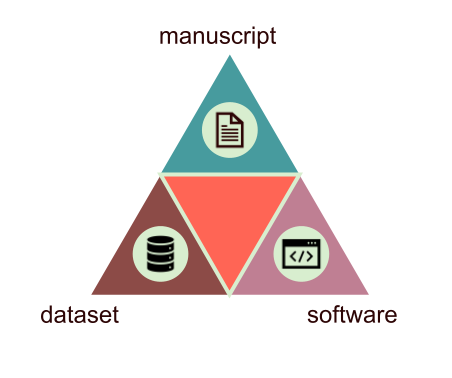Focus and Scope
How will the scientific method evolve in the 21st century? What new methods for scientifc publishing in the engineering sciences will be established in the coming years? The answers to these questions will be discussed in ing.grid, a peer-reviewed open access journal providing a forum for engineers of all disciplines concerned with data management to share and discuss experience, datasets and technologies.
The journal bridges a gap in engineering sciences offering a platform and recognition for sound scientific practice in generating research data, developing reusable tools for processing that data and curating the data to make it findable, accessible, interoperable and reusable (FAIR).
ing.grid addresses seven core topics: data literacy, data infrastructure, data governance, data economics, data ethics, datasets and data management software. Using a hybrid peer review process including single blind peer review and community peer review, ing.grid fosters open discussion and exchange in the engineering community on all issues related to data management and gives scientific credit by publishing contributions treating all endeavours regarding FAIR data management.
Focus
The focus of ing.grid is linked to seven core aspects of data management. These are not yet clearly defined and a common understanding will emerge as a result of the scientific discourse hosted by ing.grid. As a point of departure, here are some possible definitions of the core topics of FAIR data management identified by ing.grid:
DATA LITERACY is a core competence of the contemporary engineer. It is necessary to integrate it into engineering curricula from the beginning of training and offer opportunities for continuous training for qualified engineers. ing.grid provides space for concepts related to data literacy in engineering sciences and welcomes contributions such as educational concepts, best practices and case studies.
DATA INFRASTRUCTURE includes all tools required by engineers working in the data-rich environment of research and industry. When solving engineering problems, adequate tools for working with research data need to be developed. ing.grid embodies a platform for sharing progress in development of such tools.
DATA GOVERNANCE is conditional for the FAIR usability of data. With sound governance concepts and accessible curation, collaboration is facilitated for generating, processing, analysing, and sustaining data. ing.grid welcomes contributions about data governance concepts and curation strategies.
DATA ECONOMICS is increasingly relevant for engineering sciences as it has become a key input in modern economic production. As the basis of data-driven models relying for example on machine-learning algorithms, the economic value of data in engineering sciences cannot be overlooked. ing.grid is open for critical perspectives and discussion on the topic of data economics.
DATA ETHICS studies and evaluates moral problems related to data (including generation, recording, curation, processing, dissemination, sharing and use), algorithms and corresponding practices, Recognising data ethics as a pressing and often neglected topic in engineering sciences, theoretical work as well as critical perspectives and discussion on this topic is welcome in ing.grid.
DATASETS are the basis or the result of research activities. ing.grid thematises good practices in structuring datasets as well as suitable data and exchange formats that are particularly useful for the engineering community.
DATA MANAGEMENT SOFTWARE is software that has been developed specifically for the purposes of data management. ing.grid is open for submissions offering innovative approaches to the development of data management software and serves as a platform for discovering and improving it.
Scope
 Manuscripts
cover best practice examples of data management techniques, workflows
and operationalisation, and collaboration and interdisciplinary
research. ing.grid accepts a triumvirate of submissions:
Manuscripts
cover best practice examples of data management techniques, workflows
and operationalisation, and collaboration and interdisciplinary
research. ing.grid accepts a triumvirate of submissions:
(i) Manuscripts and Tutorials
Manuscripts may also contain education concepts for teaching data literacy in all stages of an engineering career. In all cases, submissions should include minimal examples of utilised research software and sample data or course material, respectively.
(ii) Datasets and APIs
Datasets are collections of data assembled for a clear scientific purpose using a sound scientific practice (e.g., measurements or experiments) with value to the engineering research community. They need to be published in an accessible data repository specified by the journal. Submissions of datasets must include a data descriptor. Data descriptors are manuscripts that offer a detailed description of the research dataset, the method for generating or gathering the data, and a technical analysis evaluating the quality of measurements. Dataset and data descriptor must be linked with one another using PID. Supplementary material may include a minimal software example to illustrate the dataset's generation and/or processing.
(iii) Software
Research software submissions contain stand-alone software modules written to facilitate engineering research. The published software offers technological solutions to problems arising in RDM of practical engineering research. They should further include documentation in the form of a user manual and a sample dataset to demonstrate the software module's functionality. The software must have been published in a software repository and referenced in the submitted software manual using a PID. Supplementary material may include tutorials for enabling users to learn how to use the published software.
Each of these submission types relies on supplementary material from the other two.
Invitation-only non-peer-reviewed contributions
Data Management Letters are published in ing.grid on an invitation-only basis as a fourth submission type. Data Management Letters are not peer-reviewed articles. Instead, they can be opinion pieces, interviews or short reports. At least one Data Management Letter is published with each issue as an editorial piece.
